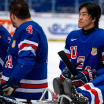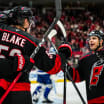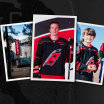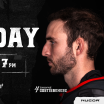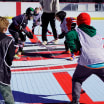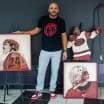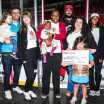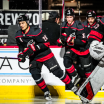RALEIGH, NC. -Here is a boy, alone in the rink on the Ochapowace reservation in rural Saskatchewan. The lights are off except on the ice surface itself. Perhaps the building is haunted as some of the folks say. Maybe not. But the boy takes no chances. He has his headphones on with his favorite playlist and he can feel the way the blades cut into the ice as he races around and around. It is his happy place. And he knows nothing can touch him there.
Burnside: Ethan Bear's Story
How a young man proudly from the Ochapowace Nation has become the NHLer he is today while not forgetting where he's from and how he can give back
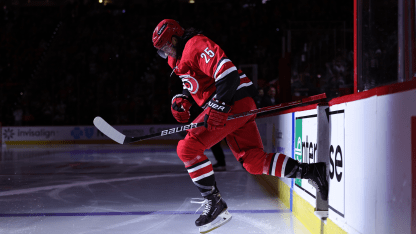
Here is the boy, now a teenager, fairly exploding with pride as the bus carrying his major junior hockey team from Seattle makes its way down the single road leading to the reservation and into the arena parking lot. The visit is like a present waiting to be opened on Christmas morning, a gift for both his teammates who will share in the young defenseman's culture and past, and for the kids who line up at the arena to see teenage hockey players who are like gods to them.
Here is the boy, now an NHL player, the subject of abhorrent racial abuse following an NHL playoff series loss standing up along with his fiancé confronting his abusers and shining a light on intolerance and hate.
Here is the NHL player in his new home in Raleigh, playing an important role on one of the best teams in the NHL.
Here is Ethan Bear.
We are sitting with Bear in the empty media dining area not far from the Carolina Hurricanes locker room. He is fresh off a 10-day stint in a San Jose hotel room getting over a positive test for COVID-19. He admits it feels weird being back in the land of the free as it were.
Over the course of an hour, we will touch on many of the most meaningful moments in Bear's life and the people who made them so. We'll come away as impressed as we've been in a long, long while at the end of an interview. We will be reminded that hockey is a game but that it does not define those who play it, at least the ones with substance.
Bear, 25, grew up on the Ochapowace Nation reserve part of the Cree First Nation in southern Saskatchewan not far from the Manitoba border.
The Ochapowace Nation controls more than 18,000 hectares of land. There are almost 1,400 band members according to the Ochapowace website, about a third of whom live on the reservation.
The band is involved in a number of business operations including beef cattle and mining.
There is a first-class rink there although Bear's first hockey memories involved traveling with his mother to see his older brother play hockey in The Pas, Manitoba.
Back home, the rink on the reservation was the sun around which Bear's life orbited.
"Back home on the reservation, I didn't have much to do but hockey. And that's what our reserve is known for is producing hockey players. There's a lot of good hockey players and the rink would be open. If there wasn't practice or a game it would be open for free for any of the kids to skate. We'd go in and they'd leave half the lights on and you'd go out and play. You'd just rip around. I remember you'd get those old Walkman iPods and you'd get your 20 songs and I'd go and put the headphones in and go and rip around for two hours until somebody showed up and then you'd play with them and some team would have a practice and we'd all run around playing ball tag around the rink and once they were done we'd go right back on the ice."
"I remember being at that rink probably most of my childhood. I'd literally go right from school, I'd go to the store, get something to eat, go to the rink. Half the time I was in there by myself. I remember, I'd always go to the rink and I'd be there by myself and sometimes the rink guy's there and sometimes he's not. But it'd be dark and the rink was haunted too. You would hear things and you'd hear people say 'I've seen this. I've seen that.' So when you go there you're like, oh God I'm so scared. So one of the biggest things I remembered was I'd go on the ice and he would turn the lights on for me but then he'd walk away and you'd never see him for the rest of the night because he'd flooded the ice already and I remember putting the headphones in as loud as they could go and just rip around and I remember that was the safe place on the ice. I know if I'm on the ice they can't touch me. You didn't have to score the big goal or go and try and impress anybody. You're just enjoying the way the blades hit the ice and stick hits the puck hitting the post maybe raising the puck over the net for once when you're a kid you know how good that feels."
Bear laughs at the memory and if you close your eyes you can feel exactly those sensations Bear is describing even though they happened long ago.
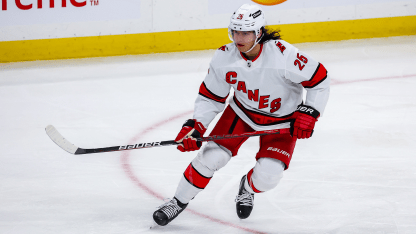
Steve Konowalchuk was the head coach of the Western Hockey League's Seattle Thunderbirds when they drafted Bear. Now the head coach in Red Deer, Konowalchuk recalled the first conversation with the Bear family.
"As soon as I met his mother she was asking, what's the best way to get to Seattle? How do I drive there," Konowalchuk said. "They were such a gung-ho family. They bought a lot of Thunderbird merchandise. It was amazing the following he had right from Day One."
At 16 and away from home for the first time, Bear made an instant impression.
"I just remember him getting on the ice and I was impressed with his hockey sense," Konowalchuk said. "He's a smart hockey player, asked the right questions. He was never a problem. One of the easiest kids I've ever coached."
Russ Farwell was the GM and part-owner of the Thunderbirds when Bear was with the team and he recalled that there were few home games in Seattle that some of Bear's family weren't in attendance. Same on the road in various WHL towns and cities where there was often a contingent of Bear supporters.
"We saw him really grow up here," said Farwell. "He was a really driven guy. It was a real family project. He had great support at home." Konowalchuk recalled a Western Hockey League final against Regina and being in the hotel in Regina and there were Bear fans everywhere.
"Half the fans there were his supporters," Konowalchuk recalled. "Kids would go to him and want his autograph."
A few years before Bear joined the Thunderbirds, the team had stopped at Brooks Laich's hometown in Wawota, Saskatchewan to practice during one of their road trips. Farwell approached Bear about whether he thought it could work if the Thunderbirds stopped in at the Ochapowace Nation for a practice.
"That was one of the most, I don't even know the words for it to be honest. It's one of the most amazing feel-good, giving back to the community things that I've got to experience in my career," Bear said.
To make the WHL, that was a dream come true, Bear said. But to actually have the Thunderbirds come to his home, well, that was something else altogether.
"You'd never think you'd get the opportunity to practice with your WHL team in your hometown, let alone your home reserve. So for me, it was just, wow. I'm not sure if people in the community realized how big of a deal that really is for me," Bear said. "It was the biggest, one of the most proudest moments I could experience because I got to show my teammates where I come from. For me, that's how I grew up and what I know. So for me to show the team what it's like to live in such a secluded place and to make it to where we are and then have them come and practice and share a bit of our culture with them."
Even now, four or five years later Bear can recall the moment of rolling into town on the team bus.
"It was so incredible the whole time. It's not even nerves. It's just like excitement. It's just like this feeling, it's like the feeling like when you get somebody a good gift and you can't wait for them to open it. You're driving down and I'm explaining to my coaches, that's the house I grew up in right there, this is the lake, this is the valley. A lot of people don't know Saskatchewan has a nice valley and I'm lucky enough to live in it and I live along the lake so I got pretty much anything I could ever need. Just drive down that road. There's only one stop sign in the whole reserve. There's no lights. There's one gas station, one rink, one school. To drive down this road with this big bus, this road I've been driving down my whole life, and just to roll into the rink and seeing all the kids with all the signs for not even myself but for all my teammates and for the Thunderbirds. It was one of the most humbling down-to-earth feel-good memories I have pretty much."
Not only did the team practice and hang out with the kids in town there was a special dinner with the team and coaches as the guests of honor.
"It was such a cool experience and we got to have some Bannock and some wild meat and stuff to share with them. A lot of the guys they loved it. They thought it was such a cool experience. For them, I think it gave them a little bit more respect for me knowing where I come from and how hard it was. It was just such a phenomenal thing that Seattle did for me," Bear said.
The team made a couple of stops at Bear's home rink during his tenure with the Thunderbirds and it was clear that it made an impression on the team just as it did on the community itself.
"He was proud of it and he should be," Konowalchuk said. "You learn to respect each other and accept each other and it was just a special time."
It was Farwell who suggested to Bear he think about hosting a hockey school on his home reserve in the off-season. Bear embraced the idea of inviting some of his teammates to help him put the summer camp together, paying for their travel, and providing them with special, inscribed blankets as a token of his appreciation. There are usually four groups of kids and they're on the ice a couple of times a day and Bear does his best to make sure he's on the ice for all those sessions. It's taxing but the camps are a reminder of his own childhood, his own dreams, and what it meant to brush up against someone you knew only from reading stories or watching television.
"I pretty much try and give them an experience that I wish I'd had when I was that age. I looked up to Jordin Tootoo, Carey Price, Jonathan Cheechoo, Micheal Ferland and I see those guys still and I meet them and I'm like, oh, Tootoo, I'm just like he's my idol," Bear said.
He laughs at the crazy notion that he's somehow found his way from wide-eyed youngster to an NHLer just like his idols.
"I remember going to Jordin Tootoo hockey school when I was young and I remember that one time I saw him and it was the best feeling in the world," Bear said. "And sometimes it's even hard to put myself in those shoes even though I am. Sometimes at the (hockey) school, they don't realize that I'm more excited to see the kids than they are excited to see me. I think it's a happy, happy experience for all of us."
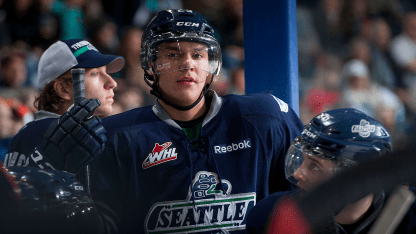
Courage Bear is Bear's cousin who coaches a AAA midget team in Saskatchewan and is also the founder of the Indigenous Sports Academy whose hockey team is made up entirely of indigenous players. He also does much of the heavy lifting at Bear's summer hockey camp.
He understands better than most the odds against any player making the NHL let alone a First Nations boy from a small reserve in rural Saskatchewan and he knows the importance of staying connected to those roots.
"We both appreciate and know where we come from so it's important for both of us to give back," Courage Bear said. "It's good that he knows and that he understands the importance of that and is grounded in that."
He recalled that watching Bear's games once he broke into NHL with Edmonton became a family ritual of sorts.
"For us, it's a family event," said Courage whose three children are huge Bear fans and who rarely miss a game.
But it's not the fame that draws them - although watching Bear on Hockey Night in Canada is admittedly as cool as it gets - but how fame and success have not altered his core personality.
When he comes home he's the first person to get the mini-sticks out to play with the kids or to take shots outside.
"We're proud of the person he is, how he treats people," Courage said. "Sure, we're proud of his hockey accomplishments but I think that's the stuff we're most proud of him about."
"This is about a true story of 'What one child can do!'" offered Ochapowace chief Margaret Bear a distant relative of Ethan Bear's in a written response to a handful of questions forwarded to her during a trip out of the country.
"Ethan's success as a professional athlete brought an array of shining hope to our children and young people of our Nation and to those across First Nations country. His success eloquently inspires everyone, big or small, with a message to not be afraid to dream BIG!" she wrote. "Any goal, anything that you want to be in life, is achievable with dedication, perseverance, and commitment. Support is so important in any child's development. Ethan had the support of his family from the time he was able to put skates on to the day his skates touched the NHL ice and continues to this day."
Margaret Bear recalled how Bear made a point of visiting the community one winter when he learned that leaders there had declared a state of suicide emergency among young adult men. "He felt in his heart that he needed to assist in some way, so he returned home to offer his support to the men, who were going through a tough time," Margaret Bear wrote.
On one wall of the Hurricanes' locker room at PNC Arena in Raleigh is a place reserved for pictures of a person who has made a significant impact on each player's life. Often it's a parent. Maybe a sibling or mentor of some other kind. Bear's picture is of Chief Denton George his di facto grandfather.
"My grandpa, his name is Chief Denton George, and he was the chief for my reserve for 20 years and he's probably one of the most well-respected, humble, down-to-earth men I've ever met. He's someone that just he took care of himself but he cared for others at such a high degree," Bear said.
"It was never about him and it was always about the community getting better. It didn't matter whether you were rich or poor he'd treat you the exact same way. For me growing up, I didn't have many role models to look up to. I always noticed how he would always do the right thing but at the same time, he wasn't selfish with his time. He was always willing to give a hand even if it was just to give somebody a ride. If someone didn't show up for their job he'd go and fill in their position. Little details like that. Just being a leader," Bear said. "And for me, that was something that I really looked up to. Sometimes it can be inconvenient to help somebody. You're busy. You're doing this. I always liked him because he found a way to slow down life and enjoy the moment and that's something I cherish. He was a helluva leader and he was a very well-respected chief in Saskatchewan. I go talk to communities and I go talk to kids and stuff and tell them my story and there will always be an elder or a past chief who will come up to me and mention his name and when I hear that it's probably one of the prouder moments and something I'm very thankful to have had a man like that in my life."
Denton passed away before Bear went to Seattle to play junior hockey and of course before he made his NHL debut with the Edmonton Oilers who selected him with the 124th pick in the 2015 draft. But the lessons learned from Denton have helped form a strong sense of what Bear expects of himself, an understanding of what kind of role model he represents to First Nations boys and girls.
"I wouldn't say it's part of my job. It's just more that I wanted to do it to encourage (kids). I just think about myself. I think about 10-year-old Ethan, what he would like. What I'd want. It's not a whole lot to go give back. Smile at somebody. You never know how it might change their day," Bear said. "For me, it's just I think it's something that is just natural. I care about others. I care about other people. I want them to be happy and to experience everything they can. And for me playing hockey and experiencing life away from the reserve is probably one of the most eye-opening things for myself. Because growing up there wasn't a lot of successful First Nations people. So for me, it's like yeah, I'm very fortunate to have role models like Carey Price and Jordin Tootoo. I always say in interviews and mention their names because I couldn't imagine being the first and Jonathan Cheechoo, being the first famous First Nations players. Those guys, it must have been hard for them. They were the only ones for a long time and now there's a bunch of us in the NHL."
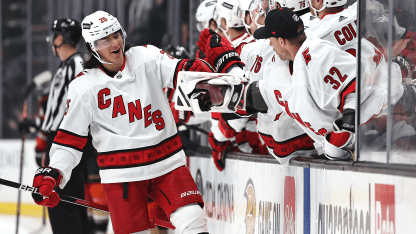
Bear's fiancé Lenasia Ned is from Kelowna, British Columbia. The two met via social media back in 2015 and it turned out they had much in common. Both are athletic - Ned is an avid hockey and soccer player and played soccer at the university level - and as they chatted remotely they discovered they'd competed at some of the same aboriginal sporting competitions.
Ned's father was an accomplished hockey player growing up and continues to play to this day. Both Ned and her older sister played growing up and their dad was often their coach.
"I ended up falling in love with it," she said. "Hockey's always been my passion."
After chatting online Ned finally met Bear in person when Seattle was playing in Kelowna. As it turned out a large number of Bear's family were also in Kelowna for the game so Ned got the full family experience from the get-go.
"So I met everyone at the same time, it was funny," Ned said.
Ned recalled visiting Bear's family home for the first time and being amazed at how different it was from her own experiences having grown up on a much more urban reservation outside Kelowna.
"For me going there for the first time I was shocked," Ned said. "I've never been to a reserve that was so rural. When I went to his home it was an eye-opener. It's so rural but everyone's a lot closer. It's all family-oriented there. Everyone's at the rink or at the school. It just felt a lot more homey. And you feel like you're just on the land."
During the pandemic off-season, Bear and Ned would sometimes make their way into the reserve's arena late at night. Bear would go through his workouts with Ned, who has also worked as an instructor at Bear's summer camps, feeding him pucks. Sometimes Bear's sister and nieces would join them for these impromptu midnight workout sessions.
Ned grew up in a family that valued sports and valued their aboriginal heritage including traditional dance, language, and dress. In Grade 10 Ned was asked to be an indigenous ambassador for her school district and she recalls the thrill of speaking to her class for the first time about her culture and background especially given the fact that her mother was forced to attend a residential school as were her father's parents.
"I was taught a lot to just love who I am and to speak our stories and our truths," Ned said. "A lot of our life was taken away from us. And we've worked really hard to bring it back together."
Ned is currently working to complete her geography degree with a minor in indigenous studies and she hopes someday to do a Master's Degree in sustainability. The last year has been marked by extreme highs and lows for the young couple including a move to the different geography, climate, and culture of North Carolina. There have also been challenging moments in dealing with racism and hatred that have tested their resolve.
"There's always bullies in life. Schools. In the game. Workplace. It doesn't matter. There's always some kid or adults or whoever it is, people who are insecure or jealous," Bear said. "I know growing up when you deal with it you're kind of why? Why would you say that? Why did you do that? Well, he doesn't know. And that's the thing. A lot of people are uneducated or are just straight-up arrogant. And I think for me the best thing, well, I remind myself that it's not true (what they said) and come from a place of empathy and those people are uneducated or maybe they're just raised by the wrong people. And it's not their fault. So for me, it's just about correcting people when you get the chance. And growing up it was just about letting my play do all the talking. Work hard. Get somewhere. And at the end of the day, that's the best way to win."
But what if the attacks aren't delivered by an opponent on the ice or an adult in the stands but by some faceless coward behind a keyboard posting ugly remarks on social media? Well, that's a whole other thing and it's a whole other reality. It was Bear's reality in the aftermath of Edmonton's shocking first-round playoff loss to Winnipeg. The Jets swept the favored Oilers and Bear was swept up in the anger that followed for some fans. A torrent of racist remarks instantly appeared on Facebook and Instagram and other platforms. Bear's first inclination was to ignore the remarks but after talking to Ned they decided instead that they would not stay silent but would speak out publicly to let people know about the comments and to confront the hatred by shining a light on it.
"It was probably one of the scariest, hardest things that I've had to do," Bear said. "I don't mind talking to somebody on the side and telling them 'this is how I feel dude, you might want to do something about it.' But when you go in against multiple people who hide behind a keyboard and the screen and then you're in the NHL and you're going to make a statement, it's a big deal. And for me there was a lot of, should I do this, should I not? Are we doing a good thing? Are we doing the right thing?' You don't want to just do it for fame and clout and you want to do it for a good message and show people how you actually feel. And for me, that was one of the hardest things I've ever experienced in my life. I've experienced racism growing up. Yeah. But when you deal with it at such a high extent and literally in front of Oilers' Facebook pages or Instagram messages or comments and stuff like that and no one's doing anything about it and they just leave it there? They say oh don't let it affect you. It's easier said than done. It makes you mad. We're all human."
The response was overwhelmingly positive from within the hockey community and beyond. A B.C. teacher helped organize a jersey day where people wore their favorite indigenous athlete's jersey. Many wore different hockey jerseys with Bear's name taped on the back. From all corners of the hockey world, people reached out to show their support for Bear.
"It's pretty inspiring to see how many people believe in him," Ned said. "He's continuing to do the work he's promising to do. He's not just saying things he's doing things. He genuinely cares about all the native boys and girls that want to make it somewhere."
And not just aboriginal youngsters, but all youngsters who have to face adversity or obstacles in whatever form they may take.
"I remember there was this family from Saskatchewan they were East Indian girls, people from that culture, they messaged me after and they sent me a thank you for standing up. Because I just didn't say it for First Nations people, it's for all people," Bear added. "You can't just do this and expect you can get away with it. I don't feel like a lot of people call it out enough and when it is there, 'oh we don't want to talk about it.' And the harder conversations are the ones that are easy to shove it off to the side."
The girls - they appeared to be elementary school-aged, Ned recalled - told Bear that they were so moved by his public stand that they were wearing their own traditional clothing to school for the first time.
"And for me I was like, wow, I must have impacted or inspired them or gave them some kind of encouragement to be themselves and that's the best, that's what it's about," Bear said. "Be yourselves. Be comfortable in your own skin. Everyone's got the same opportunity in this world."
Farwell and Konowalchuk both tried to reach out to Bear immediately following the attacks.
"It's tough to watch," Farwell said. "It was tough watching knowing the kid and how into it he is and how serious he is. The comments were totally wacko. I give him credit for standing up. Something had to be said."
The reality is that these kinds of comments are the reality for many First Nations people. "It's easy to sweep under the rug," Courage Bear said. But by speaking out Bear reminded people, both those who make these comments and the victims of these comments, that it's not something that has to be or should be accepted.
"Hopefully it creates an awareness," Courage Bear said. "It still needs to be called out. Everybody has a part in making it better and that includes Ethan and the broader public. We need more allies to speak up."
Margaret Bear said she felt Bear's response was "the most brave and best way to address racism by standing up and speaking out against it. He knew that it wasn't right and he that he needed to send a message to all athletes just beginning their journey in the elite stage of any sport that they may at some point encounter this type of behavior." "Because he is a kind and humble person, he did it in an assertive manner. He echoed loud and clear his late kohkom (grandmother), Gracie Bear's words 'Be kind to one another. Love one another.'"
Almost exactly two months after the incidents in Edmonton Bear was traded to the Hurricanes for Warren Foegele. It would mark a brand new chapter in Bear's life.
"For me, I was happy I left but I was sad because I loved the city and I just wish it ended on a better note," Bear said.
As for Bear's transition to Raleigh? It's no surprise to Farwell that it's gone seamlessly (outside the COVID issue of course).
"I know Rod Brind'Amour very well," Farwell said of Carolina's head coach, the defending Jack Adams Trophy winner as Coach of the Year. "The way he handles his players I just knew it was going to be a great fit for Ethan. He does have a great upside."
Tim Gleason, who handles defensive responsibilities for the Hurricanes is in agreement when it comes to Bear's assimilation to the 'Canes way of life.
"Initially my first impression was just of a kind of softspoken guy. Really, really nice guy. He always wants to learn. He wants to see it, he wants to do it, he wants to see it again learn it again. He's very driven," Gleason said.
"I think he was looking for a fresh start," Gleason added. "We've had conversations before it all started, just kind of getting where he came from with Edmonton to now it's a big change for him from a systems standpoint because we do want a lot of things from the 'D'."
Here is a boy who has become not just a pro hockey player but something else altogether.
Worth A Click:
Excerpt From "The Whalers" by Pat Pickens
Recap: Andersen Phenomenal As Canes Take Shootout Win In Ottawa
Ethan Bear Gallery



